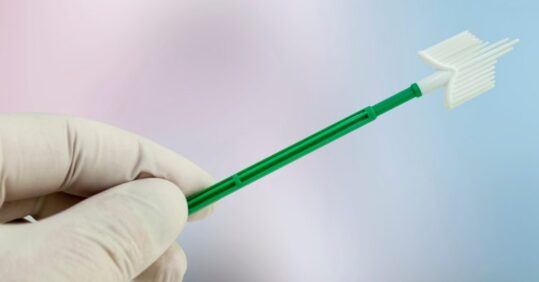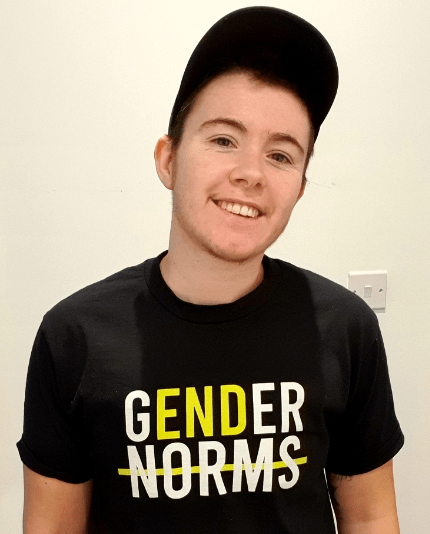Experiencing cervical screening as a trans man

Seb Daniel explores the challenges of accessing cervical screening as a trans man – and how practice nurses can help.
I went for my first cervical screening at almost 28 which I know is late. I was invited a few years before, but I’ve always had a lot of anxiety around the test and the process of it so I avoided going. I am trans-masculine and non-binary, so the gender identity aspect has caused me a lot of stress and it’s only been recently that I’ve felt ready to attend cervical screening; I wish I had done it much sooner.

Unlike some trans people, I haven’t changed my gender with my GP. Changing your gender marker can cause complications. I have heard of trans individuals missing their invitations for certain procedures or not receiving the correct care for their bodies. Keeping my gender marker as female has meant that I still received my cervical screening invite through the post. Although changing my gender marker to Male would feel more affirming, it would also cause me to worry that I would then be treated medically incorrectly or miss out on important correspondence. Not everyone feels the same way about this and many trans individuals change their gender marker without any negative repercussions. For me, it’s more important right now that I am able to change my name.
Related Article: NHS plan delivery must equip and empower nurses, midwives and nursing associates
The information leaflet that came through with my screening invite was relatively inclusive which surprised me but it was very clinical and not very warm. For those of us with huge concerns around an invasive procedure, it would have been comforting to have had more inviting language used. In contrast to this, I feel lucky in that the nurse who did my test was amazing. She explained everything including potential outcomes and results in a much friendlier and more accessible way.
Going to the GP can be really difficult when you are trans, particularly when you haven’t legally changed your name yet. My birth name is very feminine and you generally have to out yourself at some point when dealing with medical professionals by having to explain who you are. I had been hesitant to call to speak to the reception staff at my GP’s as I knew I would have to do this and was concerned that their reaction may have been unpleasant (as I have had negative experiences in the past). When you’re called for your appointment at my surgery your name is displayed on a huge screen for everyone to see, or it’s shouted out by a member of staff. No one ever thinks it’s me which is on one hand very affirming, yet on the other very exposing.
My partner (a cisgender woman) and I have been speaking about going for our cervical screenings semi-frequently for a few months. She had her own worries and concerns about the test, which helped me feel more valid in mine as we were worried about some of the exact same things. We were able to book our screenings for a few days within each other with hers being a few days before mine. This was so helpful for me as it meant she was able to talk to the nurse about my upcoming appointment and to let her know that I was worried. It meant that the nurse was prepared to meet me and it also meant I could bypass the reception staff. My plan had always been to book a test and then on the morning of the day to call and say I was feeling anxious and explain that I am trans. I know it was lucky that my partner had that conversation for me. Since speaking to the nurse who did my screening, she has said that if you are worried prior to your appointment, you can book a telephone appointment with the nurse who will do your screening and speak to them beforehand.
The test is incredibly invasive and some of the barriers to it – PTSD, experience of sexual assault – can affect anyone regardless of their gender identity. There are clearly issues specific to trans men on hormones, which can cause changes to the vagina for example, but also many more barriers that can apply to all of us. Having since spoken to a few practice nurses, I’ve learned that they genuinely have seen it all and it’s well worth explaining any concerns you have to your nurse prior to the screening. I thought my test would literally be one of the worst experiences of my life, but my nurse was so kind and understanding that it was quite the opposite.
Related Article: NMC seeks nursing leader to oversee Code and revalidation reviews

She explained how things worked and made sure to check my understanding of what she was saying. She made a really conscious effort to try and engage with me, she made jokes and immediately used the correct pronouns. Her terminology wasn’t perfect with the use of some outdated terminology, but if she made mistakes she would correct herself and this made me feel so much more visible.
Healthcare can be worry inducing for lots of us and we have to approach it in the way that best suits us as individuals. It can be hard to share how you feel with healthcare professionals but if they don’t know your personal situation I don’t think you can always expect them to be extra understanding as they simply won’t know what you need. Asking for a specific nurse, finding a specialist service or even simply asking your GP for advice on your options can be beneficial.
Related Article: Tell us what practice nursing means to you and potentially win £1,000
As a trans person, It’s rare to see myself reflected in any information about cervical screening or people who look like me sharing their experiences, which is why I want to share my story. I hope it might help even one other trans or non-binary person to book a test.
Jo’s Cervical Cancer Trust has information for patients on cervical screening for trans men and/or non-binary people, and resources for the healthcare professionals who support them. Their national helpline is on 0808 802 8000 and is free to call if you have questions, want reliable information or just need to hear a friendly voice.

See how our symptom tool can help you make better sense of patient presentations
Click here to search a symptom


Having since spoken to a few practice nurses, I’ve learned that they genuinely have seen it all.



